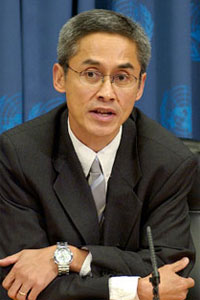There have been reports of attacks on journalists which cast a shadow of shame on the Southeast Asian region. Yesterday -- Nov 2 -- has also been designated as the International Day to end the impunity in relation to attacks on journalists.
According to Reporters Without Borders' (RSF) latest annual ranking on the global state of press freedom report, countries in Southeast Asia did poorly -- none of the 11 nations in the Asean bloc scored above RSF's "difficult situation" designation. Out of the 180 countries ranked, the only Southeast Asian country in the top 100 was Timor-Leste, an Asean observer state, according to the report released in May.
Internationally, there is no shortage of UN resolutions and other measures. There is a UN Plan of Action on the Safety of Journalists and the Issue of Impunity, dating from 2012, with Unesco as a key pillar behind its implementation. This plan of action is very much based on the three-fold strategy of "prevent", "protect" and "remedy", while calling for multi-stakeholder cooperation.
A key concern for this region is that there are very few instances of successful cases against perpetrators attacking the media whether they be state actors or non-state actors. But what is the relevance of such actions for Southeast Asia directly impacting the media?
Countries in the region are not full-fledged democracies. Some are even authoritarian with track records of human rights violations. What happens is some states have used draconian laws and policies such as extra-judicial killings, arbitrary detentions, intimidation, and censorship (including self-censorship).
The Covid-19 pandemic has further led to the use of emergency laws and disease control laws for political clampdowns which has affected the work of journalists.
Multiple cases of abuse have arisen from the application of criminal laws and legislation on the internet and cybercrimes, giving the authorities broad powers to block information and to criminalise suspects.
Some countries have adopted new laws on so-called "fake news" to counter misinformation and disinformation. Such laws bolster the state in its stranglehold through political monopolisation, while some states have also been accused of spreading misinformation and disinformation. By contrast, in international human rights law, the preferred path is for the state to respect the media and facilitate a diversity of information.
The International Covenant on Civil Rights and Political Rights and UN-related mechanisms do not prohibit reasonable limitations on such freedoms, as long as the state proves that such limitations comply with international human rights law and that they are necessary and proportionate. Countries in this region, however, tend to overuse national security laws to restore public order, leading to a situation where the civic and political space in these states was described as "shrinking, shrunken, shrunk" in a recent UN report.
Yet, it is not impossible to improve the situation. Countries in the region should review their laws, policies, and practices so they comply with international human rights. There is a need to reform provisions of criminal law which criminalise defamation, sedition and lese majeste. The preferred approach is to cover these issues through civil law instead.
Laws and policies on computer crimes and cybercrimes should be focused on specific malpractices, such as child pornography and fraud. Leaders of the country should send the right message too by publicly speaking against attacks on journalists and other media personnel. The state should also monitor attacks and violations against media workers, with due regard to gender issues in relation to harassment.
The need to remedy such violations requires national authorities to investigate and sanction those who harm media personnel. This should be coupled with the reform of the law on the time frame for taking action against perpetrators -- there should be no prescription period for such action to enable long-term prosecution of crimes. Meanwhile, the media must also raise their own standards, such as adhering to codes of conduct that must be scrutinised by the media industry. The industry needs to strive for professionalism and high quality.
Given that all countries of this region have accepted the UN-backed sustainable development goals, this is a key opportunity to prove to the world that by the year 2030, the region is targeted to improve respect for civil and political rights.
Vitit Muntarbhorn is a professor emeritus at Chulalongkorn University. He has helped the UN in a number of positions, including as UN special rapporteur, UN independent expert and member of the UN Commissions of Inquiry on human rights.
